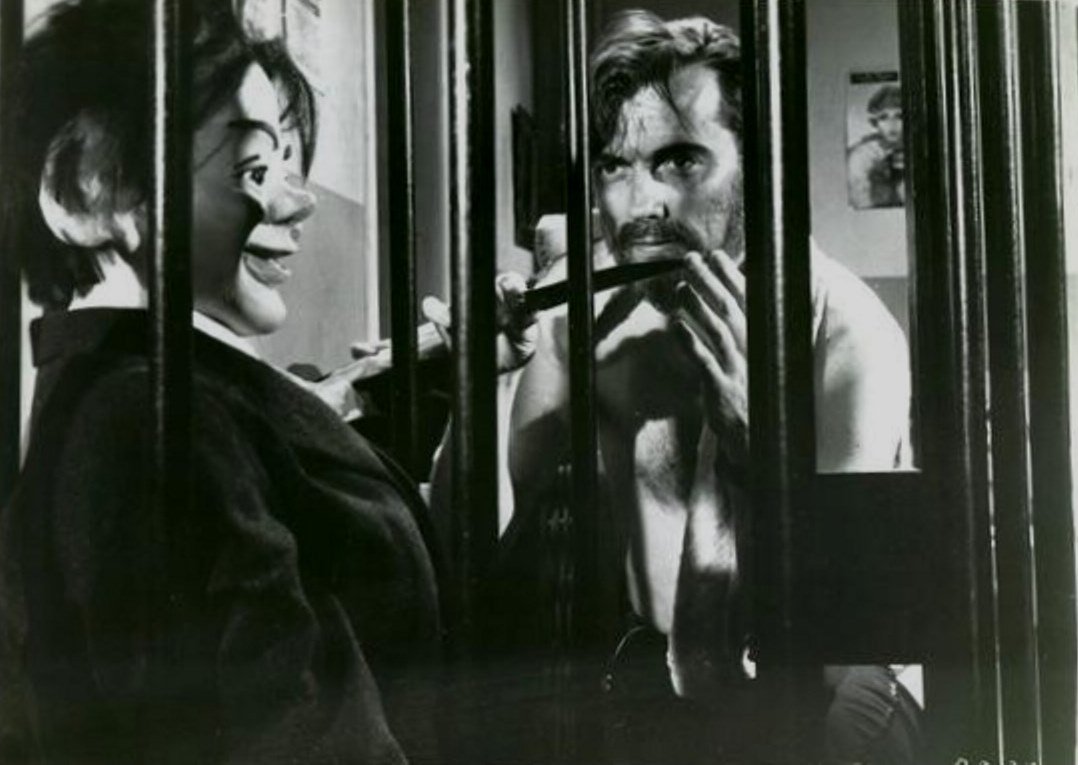
Devil Doll (1964)
“You’re a dummy, Hugo, a common puppet!”
The Great Vorelli (Bryant Haliday) is London nightlife’s latest sensation. His winning combination of ventriloquism, hypnotism and horrid stick-on beard is pulling in huge numbers of grey suited post-war Londoners, eager to be humiliated on-stage.
His dummy Hugo (plagiarise much?) is the big draw. But there’s something odd going on in the relationship between the uncanny waxy mannequin… and his dummy (boom-boom, ithankyew).
The first line in the film is Vorelli telling the dummy, directly: “You’ll never win. You’ll always lose!” before accusing his assistant of sympathy with the suspiciously child-size papier-mâché monstrosity and then making the screen go all weird.
Meanwhile, seedy newspaper reporter Mark English (William Sylvester) wants to find out the secret of Vorelli’s success, and is fully prepared to get any woman in his acquaintance to do the work to get this done. That ranges from making the coffee (hey, it was the 1960s) to putting their health and sanity on the line.
The next night English (who, confusingly, is American) and his squeeze - foxy, clearly-out-of-his-league heiress Marianne Horne (Yvonne Romain) - attend Vorelli’s show. Tonight he’s gone absolutely bonkers with a hypnotism act that even in 1964 must have contravened SOME kind of health and welfare legislation – telling a hypnotised punter that they’re about to be executed by a soldier.
“You wait for the sound of the gun and the pain of the bullets smashing through your head…”
After this display he’s lacking further volunteers from the audience (can’t think why), but luckily English is on hand… to push his girlfriend onto the stage.
No summary executions this time, though… Vorelli just turns her into a professional dancer, which is, of course how hypnotism works.
Then it’s time for Hugo. The dummy and its operators clearly have relationship problems, but Vorelli is keen to state he is the dummy’s “master”, and proves this by making it walk, unaided, to the front of the stage (which is expected, but still genuinely weird). Rather than run screaming in terror from the theatre or assume there’s a small child inside the small-child-sized dummy, the audience laps it up. Vorelli then turns his attentions back to Marianne, who he admits is being “seduced mentally” (you said it, mate).
Before we can say “that’s a bit of a coincidence” it turns out Vorelli knows Marianne is “the richest girl in all England”, and what’s more already had designs on coming to her aunt’s charity ball, with is something already part of English’s devil-may-care “as long as I don’t actually have to do any work” plan to trap Vorelli that appears to have very little to do with actual journalism.
And while we’re on the subject of nonsensical plot devices, the relationship between English and Marianne makes not one jot of sense – as vividly shown during a full-on car-bound snogging sesh where she also says she finds Vorelli attractive. Which he really isn’t.
The routine at the charity event doesn’t seem to quite go to plan, consisting as it does of a full-on argument twixt ventriloquist and dummy, which ends with the fully-mobile dummy grabbing a knife and making as if to stab Vorelli, who stops these shenanigans and insists the dummy call him “master”, which it does.
“You’re a dummy, Hugo, a common puppet!”
Still, the audience laps it up. 1964, different times.
English finally actually does something himself and checks out Hugo, who is kept in a cage (hmmm) and although appears to be moving independently, is definitely nothing more than wood and paper (as English proves by pulling his head off). Yes, this film is mining the spookiness of Hugo for all its worth.
While English is mucking about with other people’s property, so is Vorelli. He has hypnotised Marianne to come to his room (which is definitely not okay, even in 1964). English isn’t quite so lucky, he’s visited in his room by Hugo, who tells him: “Help me… find me in Berlin… 1948’.
Marianne now falls ill (her doctor (Francis De Wolff), who looks more like a spooky ventriloquist than the spooky ventriloquist, tells English it’s “nothing serious” then announces she’s delirious and in a coma – so he’s worth his weight in gold).
During her more lucid moments, Marianne claims Vorelli is calling to her, but he’s a busy boy, because he’s also working out a fool proof way of murdering his assistant (e.g. use the dummy – no, you’re right, it makes no sense as an alibi). She has become a bit of a handful (in more ways than one – there’s a lot of sex in this film for 1964, even if it is of the “lingering unzip of the back of the dress” variety).
As English enlists an equally unreconstructed colleague to dig into Vorelli’s Berlin history, the ventriloquist’s plan for Marianne is revealed, as is what is actually going on with that creepy Hugo. Suffice to say that what we are told in a flashback about how Hugo came about makes even less sense than the previous hour of the film, BUT slightly more sense than Vorelli’s plan, which in no sane world would ever lead to him getting hold of Marianne’s fortune.
Luckily, things are about to go spectacularly awry, and it’s fair to say that everything moves to a pretty satisfying (and unexpected) conclusion, all in a welter of freaky effects, speeded-up fights and that classic British horror staple (when things aren’t being burned to the ground) – the head-stomp.
Devil Doll is enjoyably daft fun, with a few censor-baiting scenes and enough spookiness to be quite unsettling, even for a modern audience.
